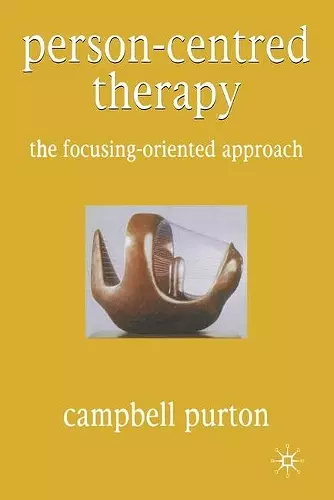Person-Centred Therapy
The Focusing-Oriented Approach
Format:Paperback
Publisher:Bloomsbury Publishing PLC
Published:29th Oct '04
Currently unavailable, and unfortunately no date known when it will be back

'This book is a 'tour de force'. Campbell Purton deploys his extensive experience as a therapist, philosopher and educator to provide a scholarly and gently provocative study of the evolution of person-centred therapy from the perspective of Eugene Gendlin, the originator of Focusing and the most influential and challenging of all Carl Rogers' early associates. Gendlin emerges from these pages as a figure of immense stature whose contributions can enrich the practice of therapists of all orientations while offering both inspirational and practical encouragement to those seeking to foster the creative and spiritual aspirations of contemporary men and women. The book has the additional merit of being beautifully written.' - Brian Thorne, Emeritus Professor of Counselling, University of East Anglia and Co-founder of the Norwich Centre. 'This volume is so rich in clinical material and theoretical understanding it can serve as a training test for therapists of any orientation. Purton clearly explains how Focusing Oriented Psychotherapy is a theory of theories - the process of forming a bodily felt sense of a whole situation cuts across all ways of working with clients and makes each way more experientially direct. He shows how sensitivity to the felt sense level lets all of our knowledge and theoretical understanding function implicitly in an experiential client-centered way...Purton has done an excellent job of placing FOT in its wider context as an After Post Modern philosopical practice, a movement for social change and a method for defining a new kind of first person variables in many fields.' - Mary Gendlin, The Focusing Institute
Since its beginnings in the 1950s, the person-centred approach to therapy has developed in many ways. It throws light on the relationship between the various schools of therapy, and on the relationship between therapy and such areas as ethics and spirituality.Since its beginnings in the 1950s, the person-centred approach to therapy has developed in many ways. In this important new text, Campbell Purton introduces the 'focusing' approach of Eugene Gendlin. The book discussed Gendlin's theoretical innovations and their implications for clinical practice. It throws light on the relationship between the various schools of therapy, and on the relationship between therapy and such areas as ethics and spirituality. It will be essential reading for students and practioners of person-centred therapy.
'This book is a 'tour de force'. Campbell Purton deploys his extensive experience as a therapist, philosopher and educator to provide a scholarly and gently provocative study of the evolution of person-centred therapy from the perspective of Eugene Gendlin, the originator of Focusing and the most influential and challenging of all Carl Rogers' early associates. Gendlin emerges from these pages as a figure of immense stature whose contributions can enrich the practice of therapists of all orientations while offering both inspirational and practical encouragement to those seeking to foster the creative and spiritual aspirations of contemporary men and women. The book has the additional merit of being beautifully written.' - Brian Thorne, Emeritus Professor of Counselling, University of East Anglia and Co-founder of the Norwich Centre. 'This volume is so rich in clinical material and theoretical understanding it can serve as a training test for therapists of any orientation. Purton clearly explains how Focusing Oriented Psychotherapy is a theory of theories - the process of forming a bodily felt sense of a whole situation cuts across all ways of working with clients and makes each way more experientially direct. He shows how sensitivity to the felt sense level lets all of our knowledge and theoretical understanding function implicitly in an experiential client-centered way...Purton has done an excellent job of placing FOT in its wider context as an After Post Modern philosopical practice, a movement for social change and a method for defining a new kind of first person variables in many fields.' - Mary Gendlin, The Focusing Institute
ISBN: 9780333969168
Dimensions: unknown
Weight: 350g
272 pages